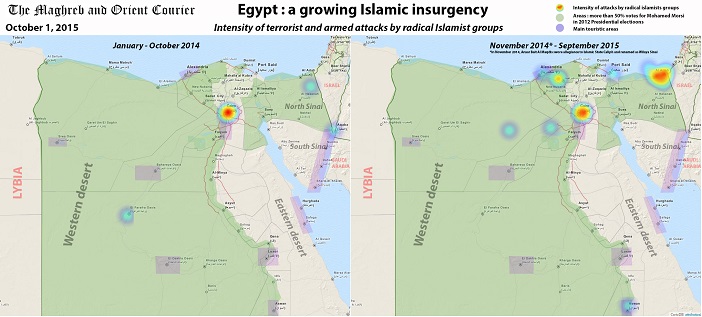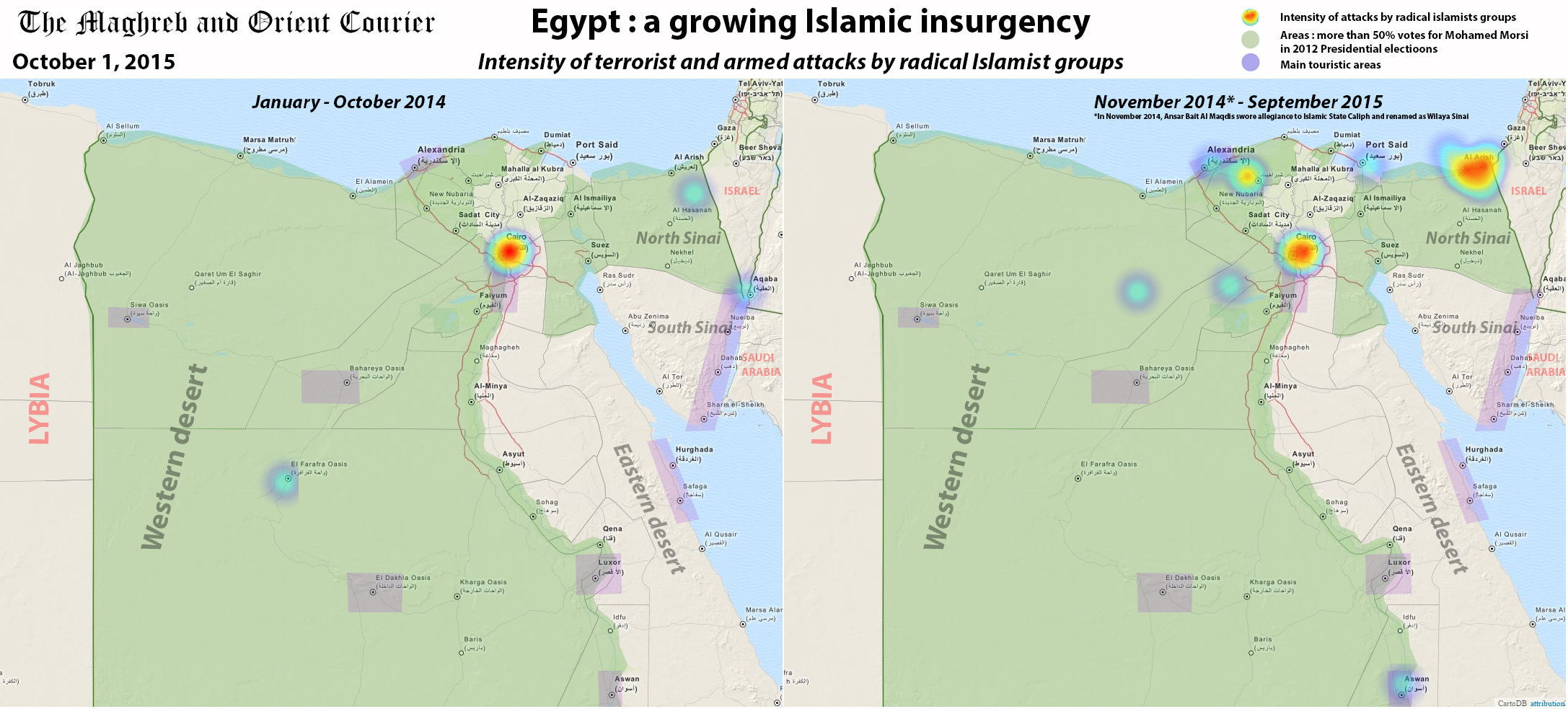When observers look at the situation in Egypt today regarding terrorism and acts of insurgency, they notice a sharp increase in violent acts in the recent months, including bombings, assassinations, ambushes and armed attacks, kidnapping and even beheadings of hostages. However, armed insurgency is not a new fact, as the country is torn by violence since the 2011 Arab spring events and its aftermath. The level of violence was already known, but it has changed in scope and strategy, the turning point being when a local jihadi group swore allegiance to the Islamic State and declared itself “Wilayat Sinai” (province of Sinai).
Click on image to enlarge it
When Mohammed Morsi was overthrown on July 3rd 2013, the president Abdel Fattah al-Sissi started the repression of the Muslim Brotherhood and officially declared them a terrorist organization on December 25th, 2013. The following crackdown brought the brothers to be largely disorganized. However, several of them joined existing jihadist groups or created others, this rally paving the way to a sharp increase of violent actions against the secular al-Sissi government. This was also accompanied by a change in the strategy and the targets. Until 2012, Ansar Bait al-Maqdis, originally an al-Qaeda linked group, mainly attacked Israeli targets along the border in Sinai, also acting in Eilat and Neguev, along with the Aknaf Bait al-Maqdis group. After the July 3rd 2013 coup, the group started to target Egyptian government interests, mainly carrying out actions in Cairo and Sinai, the group also being suspected of a deadly tourist bus bombing in Taba in February 2014. The Soldiers of Egypt (Ajnad Misr), a Salafist group founded in 2013 claimed several bombings on Egyptian forces in Cairo. From 2013 to the end of 2014, the terrorist and insurgency acts also took place in the remote Western Desert where an attack caused the death of 22 security forces in July 2014 (Al-Wadi Al-Gedid events).
In November 2014, Ansar Bait al-Maqdis swore allegiance to the Caliph of the Islamic State, Abu Bakr al-Baghdadi, adopting a new name Wilayat Sinai. This led the group to change its strategy by focusing its attacks on Cairo and most importantly on the area North-East of Sinai from Al-Arish to the Gaza strip, a region torn by the difficult relations between the Egyptian government and the Hamas and where the erratic and repressive governmental policies led many Bedouins to support or to join the insurgency. The number of attacks in this area increased dramatically, including a wide-scale armed offensive on July 1st 2015 in Sheikh Zuwayd, a city of 60 000, that the group almost entirely controlled after a few hours and where more than 70 government troops were killed. The actions also include the assassination of high ranking officers and bombings of government targets, in Sinai or in Cairo. The foreigners or tourists does not seem to be a primary target for the group, as the abduction of a Croatian oil surveyor in July 2015 looked more like an opportunity, given that it was handled by an undefined group operating in the Western Desert, which later sold the hostage to Wilayat Sinai to be beheaded. By creating this insurgency situation, the group seems to try to create a de-facto State in Northern Sinai near Gaza. In an article, a French independent researcher Bilad al-Fransi thinks that the final target of the group may be to take power in the Gaza strip from where more destabilization could be carried out in Egypt (“WilayaSinaï – ولايةسيناء” by Biladal-Fransi on September 30, 2015: ‘Le but ultime serait de mettre fin à la présence de l’armée égyptienne aux frontières avec Gaza et de briser de fait le blocus en vigueur depuis plusieur sannées. Une fois cette opération réalisée, l’EI peut s’introduire dans Gaza et y installer un gouvernement local ainsi qu’une base d’opération avancée afin de poursuivre les activités d’expansion futures au Sinaï et dans le reste de l’Égypte si l’objectif est atteint’).
The Islamic insurgency is increasing since Mohammed Morsi was overthrown. The Egyptian government is now facing frequent bombings, assassinations and armed attacks in Cairo, in some areas of the Delta and of the Suez Canal, and in the Western desert. But most important, the declaration of an Islamic State province in Sinai has led to a violent and intensive insurgency in a very sensitive area, the border with Gaza, which could have serious consequences on Gaza itself and on other neighboring countries.





1 Comment
Pingback: Agathocle de Syracuse | EGYPT : a growing Islamic insurgency (Maghreb and Orient Courier)